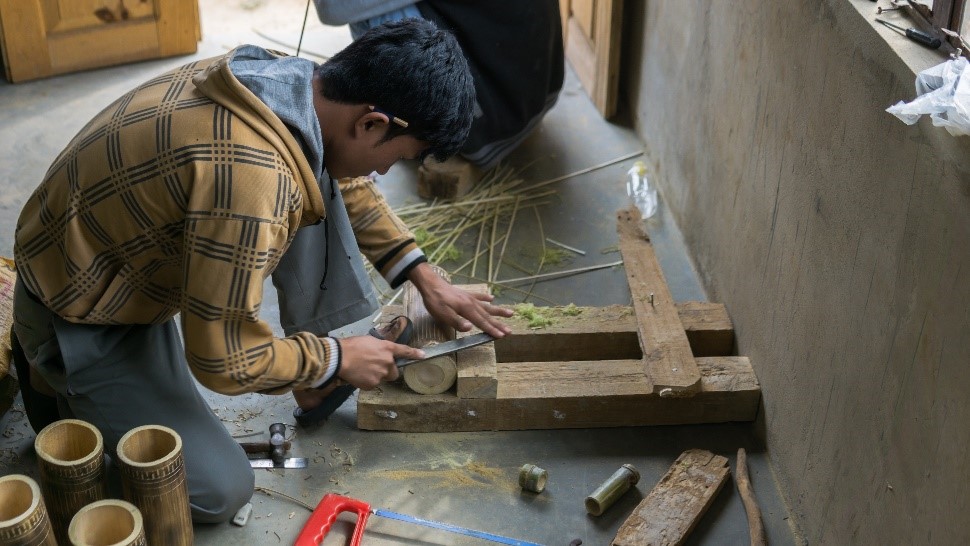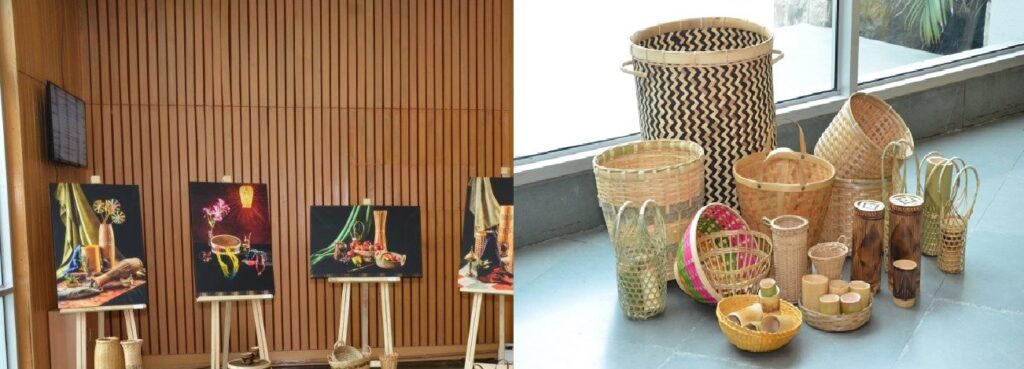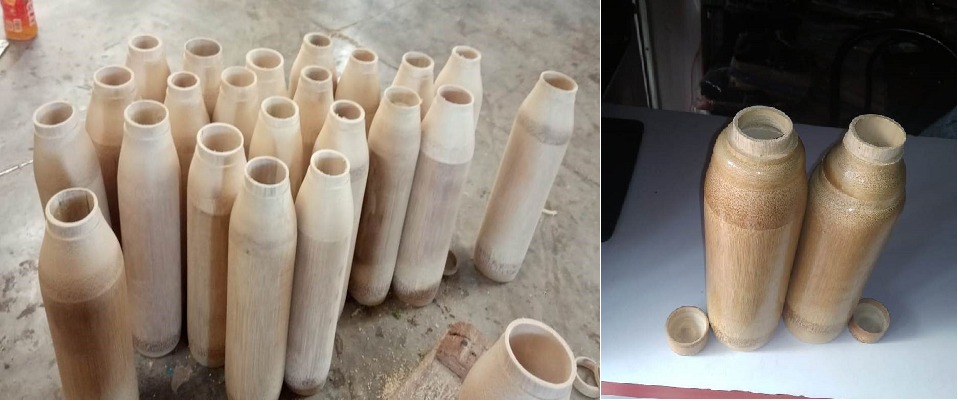
Harvesting Hope: Bamboo-Based Economic Upliftment in Dumka and Ribhoi
By fmadmin
A wonderful serenity
A New Dawn in Dumka and Ribhoi
In the bustling heart of India, within the dynamic communities of Dumka and Ribhoi, a profound transformation was set in motion. On a momentous day, March 30, 2017, a spark of hope was kindled among bamboo artisans, farmers, and small business owners. The Foundation for MSME Clusters (FMC), with steadfast support from the South Asian Association for Regional Cooperation Development Fund (SDF), launched an ambitious mission to elevate the lives of these dedicated individuals.
Igniting Dreams and Transforming Lives
This project transcended typical initiatives; it served as a lifeline aimed at transforming lives. With a substantial budget of $1,098,280, including vital contributions from SDF and NABARD, the vision was clear: to create a thriving ecosystem for bamboo-based enterprises. The journey began with the establishment of Common Facility Centres (CFCs), which soon became the heart of this transformation.
Centres of Dreams and Possibilities
The CFCs were more than just buildings; they were centres of dreams and possibilities. Artisans who once struggled with outdated tools and techniques were now receiving advanced training. These centres provided artisans with the infrastructure they had always needed but never had access to, enabling them to refine their skills and produce high-quality bamboo products.
Connecting to Wider Markets
But the impact didn’t stop there. Market linkages were established, connecting these artisans with wider markets, allowing their exquisite creations to reach buyers far and wide. For the first time, their craftsmanship was recognized and valued, and their incomes began to rise, lifting them out of the grip of poverty.
Overcoming Past Challenges
Before this intervention, the bamboo sector suffered from poor management, inefficient harvesting systems, and underutilization of resources. Bamboo-related value-added products were limited, contributing insignificantly to the economy despite the high dependence of poor tribal people on bamboo for their livelihood. The artisans were trapped in a cycle of hardship, unable to see a way out.
Navigating Through Challenges
The project faced several challenges, including disruptions caused by the COVID-19 pandemic, which delayed training sessions, market linkages, and the establishment of the CFCs. Infrastructure issues, particularly maintaining consistent power supply and facilities, affected production efficiency. Establishing robust market linkages was difficult due to the remote locations of the clusters and the absence of established networks. Continuous training was essential to overcome resistance to change and ensure high-quality production. Community engagement and fostering a sense of ownership among artisans and local organizations enhanced management and sustainability.
Stories of Change
Behind every statistic, there was a story. Stories of artisans who could finally afford to send their children to school, of families moving into sturdier homes, and of communities coming together to support one another. This project was not just about economic upliftment; it was about restoring dignity, instilling pride, and fostering a sense of community.
A Strong Foundation for the Future
The project laid a strong foundation for sustainable development in the targeted clusters. The involvement of local partners like ESAF and KKSCO ensures ongoing support and capacity building for artisans, contributing to the long-term sustainability of the bamboo sector.
A Testament to Collaboration and Resilience
In the end, it was not just a project but a testament to the power of collaboration and the indomitable spirit of the people it touched. The bamboo artisans of Dumka and Ribhoi were no longer just surviving; they were thriving, their lives forever changed by this remarkable journey. In Dumka, 98% of beneficiaries doubled their income, while in Ribhoi, at least 30% of artisans saw their income double.
Exterior and interior photos of the CFC buildings in Dumka and Ribhoi.
Artisans working inside the CFCs using advanced machinery and tools.

Artisans attending training sessions, interacting with trainers, and using new tools.
Trainers demonstrating techniques and artisans practicing new skills.
Group photos of artisans with certificates after completing the training programs.
Artisans showcasing their products at local markets, fairs, or exhibitions.

Group photos of artisans and community leaders/funding partners involved in the project.

Group photos of artisans and community leaders/funding partners involved in the project.
Story 1: Ashok Mouli - From Artisan to Entrepreneur
Ashok Mouli was a talented bamboo artisan from Dumka who struggled to make a decent living from his craft. His income was inconsistent, around ₹5,000 per month, and he often worried about providing for his family. The introduction of the SDF project brought a significant change in his life. Ashok attended a training program in Kudal, Maharashtra, where he learned advanced techniques for making bamboo furniture. Initially, he faced challenges, but his perseverance paid off. He gradually mastered the craft, producing high-quality furniture with a fine finish.
Ashok’s skills and reputation grew, and he began receiving contracts independently. He formed a team, training them to meet the demand for his products. Ashok even set up a social media account to advertise his work, gaining recognition from local government officials. His income soared to ₹17,000-₹20,000 per month, allowing him to build a large house and provide his children with a good education in an English medium school. Ashok’s success story inspired many other artisans in the Dumka cluster, showing them that with hard work and the right support, they too could achieve prosperity.
Story 2: Sumita Devi - Elevating Traditional Craft
Sumita Devi, an artisan from Dumka, always had a knack for bamboo weaving. However, her traditional skills fetched low prices, and her family’s income was barely ₹2,000 per month, barely sufficient to make ends meet. The SDF project’s intervention provided her with advanced training and access to better tools and machinery at the Common Facility Centre (CFC). Sumita learned to create high-value lifestyle products, significantly improving her craftsmanship.
With the improved quality of her products, Sumita started selling them at better prices. For instance, a lamp shade she made from untreated bamboo would sell for ₹200, but the same product made from treated bamboo and improved machinery sold for ₹450. Her income increased substantially to ₹8,000 per month, enabling her to build a sturdy house and support her children’s education.
Story 3: Lukas Rynsong - Innovating with Bamboo
Lukas Rynsong from Ribhoi was primarily an agricultural worker, using bamboo work as a secondary source of income. His income from bamboo work was around ₹3,000 per month. The SDF project introduced Lukas to advanced bamboo processing techniques and the benefits of using treated bamboo. He learned to make high-end bamboo furniture and diversified his product range to include lifestyle items and handicrafts.
Through continuous support and training, Lukas’s income from bamboo work significantly increased to ₹10,000 per month. He became a role model in his community, inspiring other artisans to adopt new techniques and improve their income. Lukas’s success highlights the potential of combining traditional skills with modern techniques and market linkages.
Story 4: Meena Damblong - Empowering Women Artisans
Meena Damblong, a skilled handicraft artisan from Ribhoi, faced numerous challenges in selling her products at fair prices. Before the intervention, her monthly income was just ₹1,500. The SDF project provided her with training on product quality and market access, enabling her to improve her craftsmanship and reach new markets.
Meena’s income increased as she started producing and selling high-quality handicrafts, reaching ₹7,000 per month. Meena’s story is not just about individual success but also about community empowerment. She began training other women in her village, helping them to enhance their skills and improve their livelihoods. Meena’s leadership and success have empowered many women in Ribhoi to take up bamboo crafts as a sustainable source of income.
Previous Article
Next Article

The Foundation for MSME Clusters (FMC) specializes in promotion of MSMEs through cluster..
Contact
USO House, 2nd Floor, USO Road,
Off Shaheed Jeet Singh Marg,
6, Special Institutional Area,
New Delhi – 110067
Copyright 2024 © All Rights Reserved


